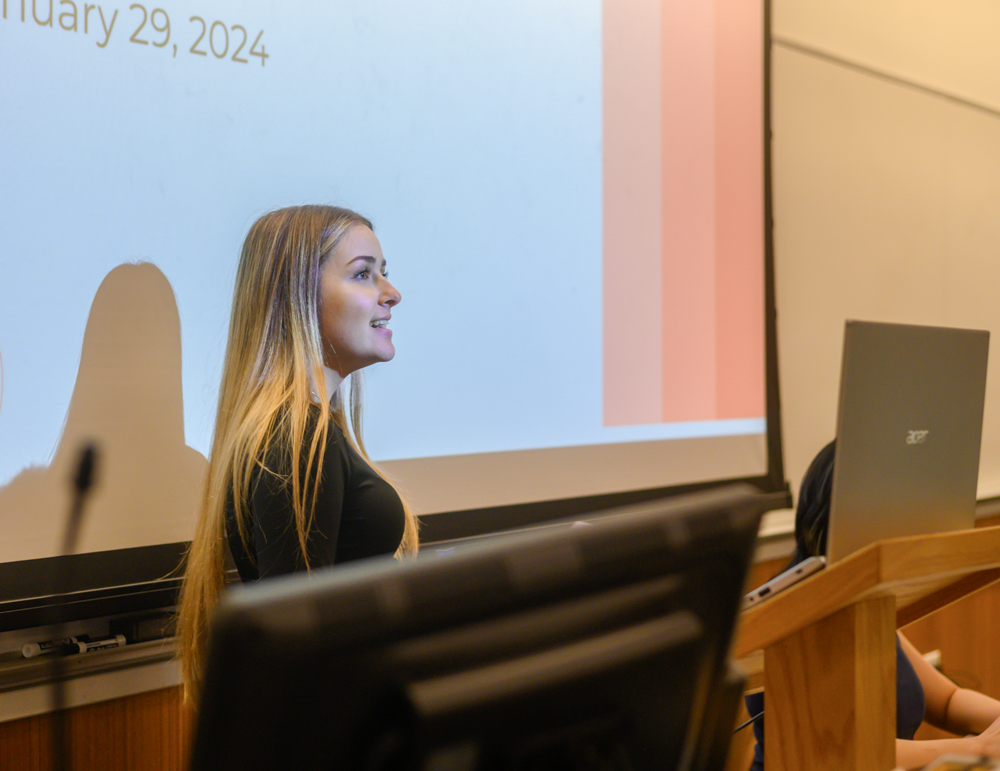Boston University Student Government heard a presentation about the challenges faced by BU graduate student workers and discussed upcoming elections on Monday night.
Anna Tsatsos, a student in the Graduate School of Arts and Sciences and coordinator for the Boston University Graduate Workers Union, said in a presentation to StuGov that BU administrators are delaying the process as they continue to advocate for academic freedom, workers’ rights, higher wages and better benefits in several bargaining sessions.

“We are bargaining in good faith, you do not need to police this even more than that,” Tsatsos said.
BUGWU requested discounted MBTA passes, parking permits, grants, reimbursements for travel, an increase in childcare stipend and parental days, improved accessibility and disability services and better student health insurance plans.
In the most recent bargaining session, the administration offered counter proposals that Tsatsos said were “basic boilerplate articles,” including appointment letters and a joint labor management committee. The union also rejected a counterproposal limiting the union’s ability to negotiate and voice their concerns, saying it was “basically a gag order.”
“In a way the counterproposals generally favor a maintenance of the status quo, and we unionize because we know we can do better than that,” Tsatsos said.
Tsatsos said the administration has been delaying the “timeliness” of BUGWU’s requests using vague phrases such as “we may do this” and “we generally will do this.”
“It really just did not seem like they were trying to be productive in these kinds of negotiations,” Tsatsos said.
BUGWU demanded a 12-month stipend of $62,440, equivalent to an hourly wage of $41.63 and housing adjustments, after a survey they conducted found that 93% of graduate workers are spending “at least 30% of their income on rent.”
Additionally, Tsatsos addressed the recent firing and evictions of the undergraduate ResLife workers following their unionization with SEIU 509 and BU’s regulation that ResLife workers must have no grades lower than a B-minus.
“The fact that the grades that we produce are used to evict our own students and to make this unfair and illegal retaliation against these ResLife workers really demonstrates why we are fighting for more power in the workplace that we have,” Tsatsos said.
Dhruv Kapadia, a senior in College of Arts and Sciences and the student body president, cited the high turnout at their Weeks of Welcome events and that he’s been discussing the “transparency” of learning assistant stipends with Amie Gills, associate provost for Undergraduate Affairs.
For the last two semesters, learning assistants have received $1,600 but the actual payment is $1,400 because they do not confirm the tax stipend.
“This is a pretty significant decrease when you’re not expecting it,” Kapadia said. “That could buy you a month’s worth of groceries.”
As the deadline for submitting student election forms approaches, Kapadia said that students who speak poorly about student government and continue to not run in an election are “the biggest hypocrites and the biggest cowards.”
“It’s really easy to go and put something on social media,” Kapadia said. “It’s really easy to talk privately. It’s not so easy to go and run an election.”



















































































































